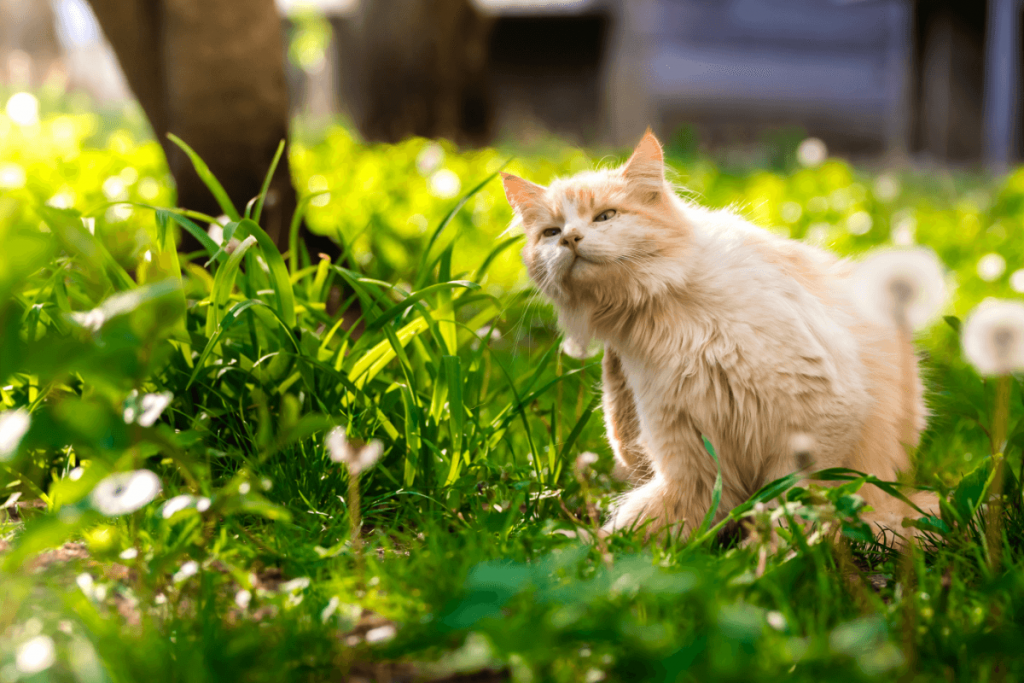Spring has sprung, and along with it comes a flurry of pollen, grass seeds, spores, and dust that can trigger allergies – not just in humans but also in our pets.
While managing seasonal allergies in people is usually pretty straightforward, identifying and treating pet allergies can be a little trickier.
At the Cameron Veterinary Services’ small animal clinic, our dedicated team is here to help you keep your furry family members happy and healthy throughout the spring season.
Common signs of spring allergies in pets
To effectively manage your pet’s spring allergies, the first step is to recognise the signs that they may be affected. Here are some common indicators to look out for:
- Skin Irritation – Have you noticed your pet licking, biting, chewing or scratching their skin more often? They might have irritated or inflamed skin caused by an allergy.
- Sores – In severe cases, allergies can cause intense irritation, prompting your pet to incessantly scratch and bite their skin. This can result in wounds that are prone to infection, leading to the development of red, pus-filled sores that may spread if left untreated.
- Hair loss – Untreated skin allergies can progress to the point where your pet’s relentless scratching, licking, chewing, and biting causes noticeable hair loss. This is particularly common in cats, where itching can trigger over-grooming.
- Runny nose or watery eyes – Much like many humans who suffer from allergies, pets can also experience symptoms such as a runny nose and red, watery eyes.
- Coughing and sneezing – If your pet starts coughing, sneezing or wheezing (more common in cats) they may be experiencing spring allergies.
- Itchy ears – If you’ve seen your pet vigorously scratching their ears or repeatedly shaking their head, it could be due to itchy ears. Pollen or seeds entering their ears can cause itching and, if untreated, lead to ear infections.
What can you do to soothe your pet’s spring allergies?

- Anti-itch products – Topical treatments including creams and sprays may help to give your pet a break from the itching. However, be careful to only use products specifically made for pets. Human treatments might do more harm than good for your furry friend.
- Remove allergens or pollens – Consider a lukewarm bath for your pet (avoid hot water to prevent skin irritation). Using hypoallergenic oatmeal-based shampoos made for pets can soothe itching and inflammation. If bathing isn’t an option, gently wipe down their coat, underside, legs, and paws after walks or outdoor play.
- Flea and tick preventative – Another important aspect of managing your pet’s spring allergies is to ensure they are protected from fleas and ticks. These pesky parasites can exacerbate allergy symptoms and introduce other health issues.
- Change your walking routine – Pollen levels tend to be higher during the early morning and nighttime hours, as well as on dry, windy days. To reduce your pet’s allergen exposure, on windy days, opt to stay indoors. Otherwise, plan your walks for later in the day when pollen levels are typically lower.
- Allergy relieving medications – Pet-safe allergy relief medications may provide some relief. The correct dosage will depend on your pets’ weight and their individual needs so it’s best to chat to your vet for advice before starting your pet on a new medication.
When should your pet see the vet about spring allergies?
If your pet seems itchy, or irritated, if they have signs of infection or if they have any areas of skin redness or inflammation, it’s a good idea to bring them in to be seen.
Unfortunately, the symptoms of spring allergies often don’t go away on their own and may even get worse if left untreated.
Cameron Veterinary Services can help
If your pet’s spring allergies are causing discomfort despite your efforts, it’s time to see a vet.
Our friendly vets are here to help you get to the bottom of what’s causing your furry family member’s allergy symptoms.
To make an appointment at our Gawler East vet clinic, you can book online or call us on 08 8318 1801.

